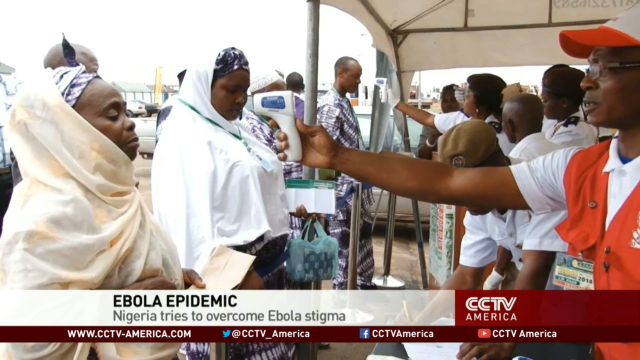Nigeria fought and won the battle against Ebola when the country was declared free of the virus last month, but it is still working to overcome the stigma associated with Ebola. CCTV America’s Deji Badmus reported this story from Lagos.

Many Nigerians have had to deal with increased scrutiny when they travel abroad.
“We have been able to manage Ebola. The whole [world] is happy with us, and we must tell the world that we have managed Ebola and no Nigerian should be segregated because of Ebola,” said Nigerian President Goodluck Jonathan.
Officials said Ebola survivors in Nigeria should also not be subject to any discrimination.
“Anybody who feels stigmatized can petition the Ministry of Justice and they will take that matter up because it is not fair and it is not right,” said Jide Idris, the commissioner of health for Lagos.
One sector that suffered the most in the wake of the Ebola outbreak was the hospitality industry. A number of foreigners either left or avoided coming to Nigeria. To raise awareness, officials of Lagos State held a small ceremony called “Lagos Welcomes Visitors” to reassure foreign visitors that not only is the city Ebola-free, but it is also prepared if any new outbreaks occur.
“We can assure you that Lagos is safe and secure for all our visitors. They can come to visit Lagos. They can come to transact businesses and they can come to live in Lagos,” said Deputy Governor Adejoke Orelope-Adefulire.
Ebola co-discoverer calls on international efforts to fight the virus
One of the two Belgian scientists who discovered the Ebola virus is calling on the international community to do more to help stop the spread of the disease. CCTV America’s Jack Parrock reports.
The Ebola virus was first discovered in September 1976. Professor Guido van der Groen, who co-discovered Ebola, said his team first received a vial of blood at their Belgian lab. They were tasked with finding out what the mysterious illness was, which sparked the medical expedition to Central Africa.
The original outbreak killed just under 300 people, mainly because there was far less mobility of people in the small village of Yambuku in Zaire. The country now is known as the Democratic Republic of the Congo.
Many now said that the science to tackle the disease must be improved, but Professor Guido van der Groen said it’s not so straightforward in the cases that exist in West Africa’s Sierra Leone, Liberia and Guinea. Guido van der Groen said, “These three countries were countries that are not peacefully organized. They had army problems all the time. A lot of the budget is going to that. Second, they have very poor or even non-existing health care system. Third, West Africa is, for the first time in its existence, to face the Ebola now. For them, it’s totally new.”
Research funding from the European Union, the U.S. and the World Health Organization has been stepped up to try to counter the spread of the disease. While individual laboratories certainly did their bit in the fight against Ebola, all the scientists agreed that a concerted international effort is the thing that’s going to prevent further epidemics.
Though Professor van der Groen has retired, the researchers remain on the front-line of investigating Ebola. Kevin Arien, who is a lead researcher at Institute of Tropical Medicine Antwerp, said, “We’re actually learning a lot during this current outbreak, which will help us contain outbreaks in the future. Because there will definitely be more outbreaks of this virus. It will not end with containing this outbreak in West Africa.”
The scientific community criticized international efforts to contain the Ebola virus for being slow, but they are determined to continue their work to try to create a vaccine for this disease.

 CGTN America
CGTN America
